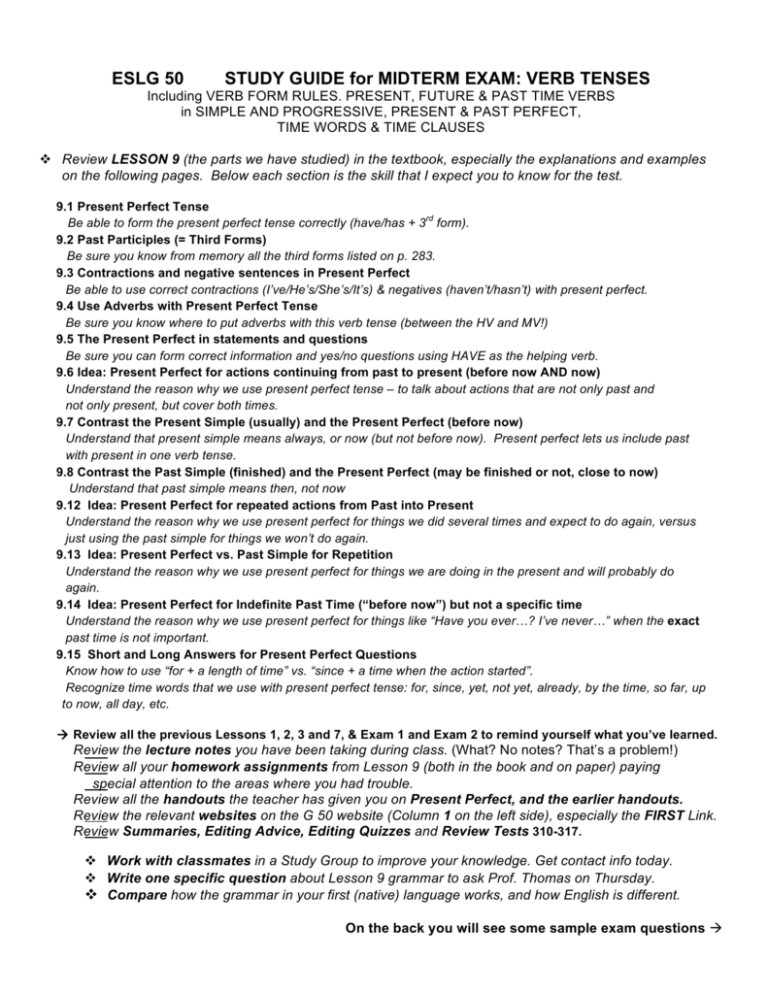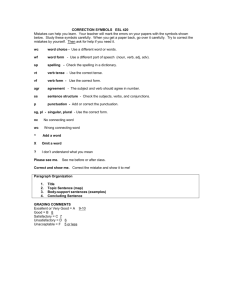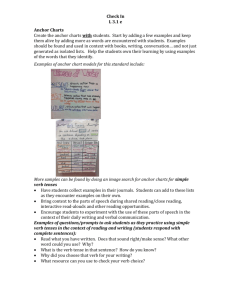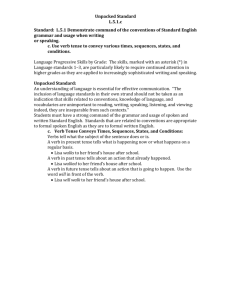ESLG 50 STUDY GUIDE for MIDTERM EXAM: VERB TENSES
advertisement

ESLG 50 STUDY GUIDE for MIDTERM EXAM: VERB TENSES Including VERB FORM RULES. PRESENT, FUTURE & PAST TIME VERBS in SIMPLE AND PROGRESSIVE, PRESENT & PAST PERFECT, TIME WORDS & TIME CLAUSES v Review LESSON 9 (the parts we have studied) in the textbook, especially the explanations and examples on the following pages. Below each section is the skill that I expect you to know for the test. 9.1 Present Perfect Tense rd Be able to form the present perfect tense correctly (have/has + 3 form). 9.2 Past Participles (= Third Forms) Be sure you know from memory all the third forms listed on p. 283. 9.3 Contractions and negative sentences in Present Perfect Be able to use correct contractions (I’ve/He’s/She’s/It’s) & negatives (haven’t/hasn’t) with present perfect. 9.4 Use Adverbs with Present Perfect Tense Be sure you know where to put adverbs with this verb tense (between the HV and MV!) 9.5 The Present Perfect in statements and questions Be sure you can form correct information and yes/no questions using HAVE as the helping verb. 9.6 Idea: Present Perfect for actions continuing from past to present (before now AND now) Understand the reason why we use present perfect tense – to talk about actions that are not only past and not only present, but cover both times. 9.7 Contrast the Present Simple (usually) and the Present Perfect (before now) Understand that present simple means always, or now (but not before now). Present perfect lets us include past with present in one verb tense. 9.8 Contrast the Past Simple (finished) and the Present Perfect (may be finished or not, close to now) Understand that past simple means then, not now 9.12 Idea: Present Perfect for repeated actions from Past into Present Understand the reason why we use present perfect for things we did several times and expect to do again, versus just using the past simple for things we won’t do again. 9.13 Idea: Present Perfect vs. Past Simple for Repetition Understand the reason why we use present perfect for things we are doing in the present and will probably do again. 9.14 Idea: Present Perfect for Indefinite Past Time (“before now”) but not a specific time Understand the reason why we use present perfect for things like “Have you ever…? I’ve never…” when the exact past time is not important. 9.15 Short and Long Answers for Present Perfect Questions Know how to use “for + a length of time” vs. “since + a time when the action started”. Recognize time words that we use with present perfect tense: for, since, yet, not yet, already, by the time, so far, up to now, all day, etc. à Review all the previous Lessons 1, 2, 3 and 7, & Exam 1 and Exam 2 to remind yourself what you’ve learned. Review the lecture notes you have been taking during class. (What? No notes? That’s a problem!) Review all your homework assignments from Lesson 9 (both in the book and on paper) paying special attention to the areas where you had trouble. Review all the handouts the teacher has given you on Present Perfect, and the earlier handouts. Review the relevant websites on the G 50 website (Column 1 on the left side), especially the FIRST Link. Review Summaries, Editing Advice, Editing Quizzes and Review Tests 310-317. v Work with classmates in a Study Group to improve your knowledge. Get contact info today. v Write one specific question about Lesson 9 grammar to ask Prof. Thomas on Thursday. v Compare how the grammar in your first (native) language works, and how English is different. On the back you will see some sample exam questions à SAMPLE EXAM QUESTIONS KNOW the five verb form rules. Know how to form present simple, present continuous and future simple by following these verb form rules, and check all your verbs to be sure they're correct. VF Rule #1: (modals) + VF Rule #2 (Q/Neg) + VF Rule #3: (progressive) + VF Rule #4 (perfect) + VR Rule #5: (passive) + KNOW the correct question word order: • • WH / INFO questions à WH question word + HV helping verb + S subject + MV main verb + the rest of it. o Ex. What have you done so far? How much time have we wasted? Why hasn’t he called yet? YES/NO questions à HV helping verb + S subject + MV main verb + the rest of it. o Ex: Has he been here since this morning? Had you ever visited the US before you moved here? FIND AND FIX ERRORS with all of the verb forms and verb tenses: • My friend Omar had have his own car for 10 years. It was been an old car. Last year he drived to visit his aunt because she was being sick. He will do the same for his uncle if he will getting sick. [5 errors] • On August 16, 2008, I get married. I have never been married, so it were a special day. Last month we have th celebrated our fifth anniversary, and our 25 anniversary has come in 2033. COMPLETE the sentence correctly with the right verb form & verb tense: My husband and I… *use future *use present perfect *use past COMBINE TWO SENTENCES with a correct connector and the correct verb tenses. My sister (call) me. She (arrive). [as soon as] [since] [while] • FUTURE • PAST • PRESENT My sister (leave). I (call) her. [before] [by the time] [when] • FUTURE • PAST • PRESENT WRITE with verb tenses (there will be 2-3 short paragraphs to write on this test): EX: Describe how your grammar knowledge has improved (or not) and how good it will be by December. EX: Write about a fun thing you did before and a fun thing coming up. Why are these things fun for you? The examples from Lessons 1, 2, 3, 7, and 9 writing activities are also good examples. 9.9-9.11 We won’t include present perfect continuous or past perfect continuous on this exam, although it isn’t hard to understand – it’s just a previous action (the same as we see in present perfect) but it continues for a long time or is happening at the same time as a shorter action. Ex: I have been reading this chapter all day [before now and up to now, continuously] and I still don’t understand it. Ex: I had been waiting for four hours when the train finally arrived [earlier past time long action that connects to a short simple past event (“arrived”)].








